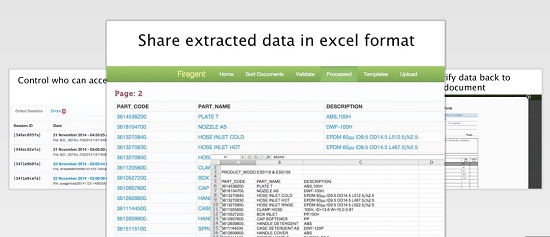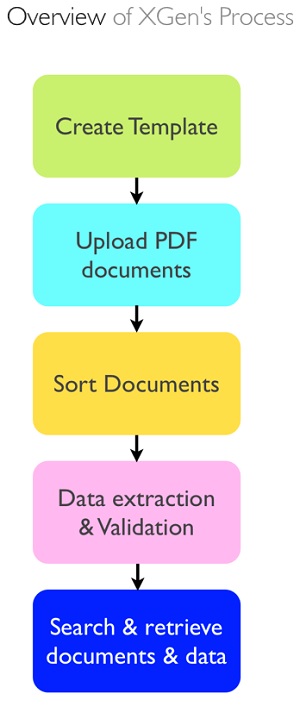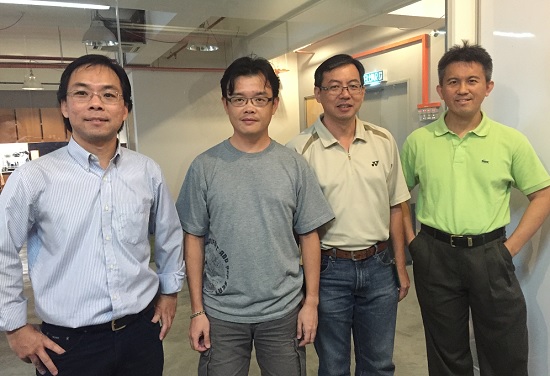Malaysian startup out to redefine document processing … and how
By A. Asohan February 11, 2015
- Intelligent algorithm recognises data patterns the same way humans do
- Bootstrapped startup now ready to go to market and scale beyond borders

JAY Cheah’s eyes are lit up, his passion palpable, as he demonstrates the product his company has been building over the last six years or so. On the screen, it doesn’t look like anything exciting is happening at all – just some documents being identified, and information being pulled out of them.
Mere documents, so while you recognise that he is using a graphical user interface (GUI), the solution’s minimalist look-and-feel harkens back to the days of command-line interfaces and green-screen monitors.
It’s only when you realise what’s happening behind the scenes that the "wow" factor sets in. Cheah, chief executive officer of Firegent iASP, has just uploaded a PDF, and is now finding it very easily in a stack of other documents – just based on information in that document, without having to remember in which folder that document is stored, or what it is filed under.
Folder? That’s 20th-century thinking. Firegent has taken a bit of the WIMP (windows, icons, menus, pointer) out of the GUI.
With the company’s XGen cloud-based document processing solution, that document exists in a neither-here-nor-there state, almost a quantum superposition, until you need it. And XGen can extract the data that you’re actually looking for, also porting it into an Excel spreadsheet so that you can get down to your number-crunching.
“It’s all-in-one cloud solution that self-organises documents, and pins and extracts their data so that users can find and locate that document and its data within seconds,” says Cheah.
Document-processing and management systems are a big market, but such systems can set you back by about US$100,000.
And documents may be unsexy creatures, but they’re an integral part of any company, big or small, whether they’re memos, invoices, purchase orders, receipts, or legal agreements.
Citing statistics from http://thepaperlessproject.com, Cheah and his Firegent team point out that 60% of employee time is spent working with documents.
“15% of an organisation’s revenue is spent on creating, managing and sharing documents,” says Cheah. “And being able to extract data from these documents is important because 90% of a business’ information is in documents.
“The way the system recognises documents is very different from other solutions: We don’t require barcodes, selected keywords or zonal markers (such as specific page layouts or blank page separators) to identify the document.
“What we do is analyse the content of the document, and compare it with other documents to draw out similarities and differences – it’s really how humans recognise documents.
“Humans are actually very good at recognising documents, we don’t search for keywords or barcodes; we look for bits of information here and there to tell us what the document is.
“It’s the same concept here,” he declares.
When a user uploads a document, XGen will start analysing it. When a second document is uploaded, it will analyse this, and compare it with the first document. When a third is added, it re-analyses the first two documents, comparing it with the third, drawing up similarities and differences between each of the three documents.
“It’s pattern recognition, and is very adaptable – it’s very dynamic in how it recognises patterns within documents as soon as you start loading them,” says Cheah.
“The recognition is amazingly accurate,” he adds, before demonstrating how much so to Digital News Asia (DNA) at a recent interview in Petaling Jaya. “It’s that quick – you can start processing documents in literally minutes.”
To do all this, Firegent had to build its own intelligent pattern-recognition algorithm, a task which largely fell to chief technology officer Adrian Lo.
 Development was done on the Linux platform, says Lo, noting however that as a web-based solution, all the user needs is any browser and an Internet connection.
Development was done on the Linux platform, says Lo, noting however that as a web-based solution, all the user needs is any browser and an Internet connection.
Being cloud-based also means that customers need not worry about buying, configuring and maintaining hardware, except for scanners.
The XGen service is hosted on Amazon Web Services (AWS). “We needed a full suite of services and that kind of reliability,” says Lo.
One technique Firegent developed was data pinning: As the document information is captured, it pins the location of the data so that you can quickly navigate back to the document.
“It’s like your favourite location on Google Maps, but we’re pinning the location of the data so that you can easily find your way back,” says Cheah.
“It’s kind of like ‘bookmarking’ the data. Instead of bookmarking a page, you’re bookmarking [data] within the page,” he adds.
Firegent chief operating officer Alan Yang quips: “It makes it also very easy to verify data. Instead of going through piles of documents to check a particular bit of information, you can quickly find the document to verify that information.”
To use XGen, the documents have to be in PDF, either text or searchable PDFs will do.
“Our base format is PDF – when you store documents, especially when you’re archiving, you need a standardised format, and PDF is the most common standard being used these days,” says Cheah.
Most scanners now come with the option to save images as searchable PDFs, he adds, so XGen does not have an OCR (optical character recognition) component.
But no folders? Most people working with softcopy documents are used to working with folders. This was however a conscious decision on Firegent’s part.
“If you use online storage services like Google Drive or Dropbox, you have to file your documents in folders,” says Cheah.
“How are you going to name these folders: By document type (invoice, purchase order), company name, or date? What happens if someone files it wrongly, by company name instead of date? That document is essentially lost,” he argues.
If users can’t break out of the habit, they can just type out the names they would have given these non-existent folders, and narrow it down with further possibilities – invoice, company name, date, even elements within the document like "butter" – until they reach that particular document.
The process, as Cheah demonstrated to DNA, took less time than you would have taken reading the above paragraph.
Birth of a business

If the seven-man Firegent team show an inherent sympathy for having to deal with loads of documents, it’s no wonder: The four founders all hail from a finance industry background.
“We had to deal with a lot of documents and reports, and organising them was a chore – we had a horrendous number of documents every day,” says Cheah.
“We had to get information from these documents and key in their data into spreadsheets to analyse, and that takes a tremendous amount of time, plus there’s always the possibility of error. Half of our time was spent collecting and collating the data, and not enough time was spent analysing,” he adds.
The four founders were either colleagues, had mutual friends, or had already worked together in one way or another, and in discussing how to deal with their problems, found an idea that resonated with all of them.
“We came up with the idea of why not have a solution that keeps your documents and their data together; and if I needed to check something, I could always go back to it. Why can’t we get them from the same place?” poses Cheah.
Firegent was incorporated in 2010. “It took a while to build the engine, because our main goal was to make it easy to use.
“It’s easy to make something hard to use; it’s hard to make it easy to use. To do this, you need to build in a lot of intelligence,” he adds.
While building this engine, a business partner told Firegent about the IBM SmartCamp programme for early-stage entrepreneurs and startups. They were urged to apply – about a week before applications closed.
“We rushed, filled in all the forms describing what we do, and what was different or unique about our solution, and about two weeks later we were invited to a conference call with IBM people in Singapore and Ireland,” says Cheah.
“They grilled me on what was so special about our solution, but it was great because they had narrowed it down to about 50 startups.
“We were shortlisted to the final 10, and took part in the final event in Singapore, a very interesting pitch competition with industry leaders, venture capitalists (VCs), and major corporations.
“It was a great experience because they provided mentorship, they groomed and advised us. We didn’t win, but were in the final round,” he adds.
According to Cheah, some VCs did approach the company at SmartCamp, but the team discussed it and decided it was too early to look at outside funding. Currently, Firegent is still a company boot-strapped from the personal funds of its founders.
“We are at the point now that the product is ready and we’re open to outside funding. Our plan this year is to go to market and look at funding,” says Cheah.
Action plan
 But it was not just personal funds that have sustained Firegent since its incorporation in 2010. The company was approached early on by a global commodities-trading company that looked at what it had and asked Firegent to customise a system for it.
But it was not just personal funds that have sustained Firegent since its incorporation in 2010. The company was approached early on by a global commodities-trading company that looked at what it had and asked Firegent to customise a system for it.
“We did a project for them. This company had more than 20 warehouses across the region, and it basically had someone key in the information at these warehouses, which was then sent to the Kuala Lumpur (KL) centre – where someone else had to consolidate all that information,” says Cheah (pic).
“The company had six people in KL processing all this, but the backlog was six months – which means that when management was looking at the data, it was six-month-old data. With our system having been implemented, they can now look at real-time data,” he proudly declares.
But this project was a special case for Firegent to earn revenue while it built out its product, which is now commercially available as a cloud-based service for US$99 per month for five users.
While the target market is small and medium enterprises (SMEs), Firegent is aware that not many Malaysian SMEs are open to adopting new technology – and also the current currency fluctuations may put US pricing out of the reach for many ringgit-earning companies – so it is also looking to scale regionally and globally.
Language support is built-in already, and XGen can "read" and extract data from any document that is in the Unicode format.
“In terms of recognition, it doesn’t matter what language it’s in – we have tested it in Chinese, Japanese and even Arabic,” says Cheah.
He admits that while the user interface is currently only in English, “we definitely want to expand to other languages such as Chinese, when the time comes.”
Firegent is also working on a partnership with a hardware company on a bundling deal, but cannot give out details until it has been confirmed, and it is also looking at various other distribution channels to spread the message.
It will be exhibiting at the Startup Asia regional event in Singapore in early May, organised by Tech in Asia.
“We will also be looking at how to create greater awareness through social media and other channels, and although we’re starting off in Malaysia, we will also be looking at how we can expand,” says Yang.
Digitised economy
What Firegent is doing is certainly very much in line with the Digital Malaysia programme, which aims to transform the nation into a fully-developed digital economy by 2020.
To do so, lead agency Multimedia Development Corporation (MDeC) identified three strategic thrusts:
- To move Malaysia from being supply- to demand-focused, or to reallocate resources to more demand-focused activities;
- Shift behaviour from being consumption- to production-centric, or to change consumer mindset so prevalent in technology use so that Malaysian individuals and businesses produce as much as they consume from digital technologies; and
- Evolve from low knowledge-add to high knowledge-add, or increasing the development of local talent in key industries to become innovators and knowledge workers.
Firegent and its XGen solution ticks all three boxes, especially in terms of creating or innovating – in this case, having developed a solution that would in turn help more Malaysian companies harness technology to boost their own efficiency and competitiveness.
MDeC also manages the Multimedia Super Corridor (MSC Malaysia) project, which aims to further develop the ICT industry in the country through various programmes and incentives.
Firegent is already located at the smart city of Cyberjaya, and one of the requirements for any company to be accorded MSC Malaysia status, and thus eligible for the many incentives, is that it be housed at a designated "zone," of which Cyberjaya is one. Can MSC Malaysia status be far behind?
“Absolutely!” declares Yang. “It’s very much in our plans to apply for MSC Malaysia status.”
Cheah adds, “We will definitely be looking into applying for MSC Malaysia status when the time is right, and we can take advantage of the incentives.
“We’re from a finance background, so we crunched the numbers to see when it would make sense,” he chuckles.
Related Stories:
Small software firm finds global success, hit by double-whammy
Traditional software firm makes IoT play
Streamlining operations a 'strategic necessity,' says Kofax
For more technology news and the latest updates, follow us on Twitter, LinkedIn or Like us on Facebook.

